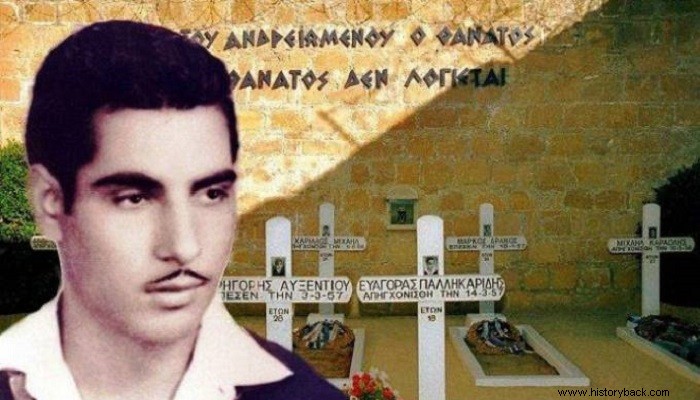
When he was born, on February 26, 1938, his parents gave him the name of the ancient, great king of Salamis, Evagoras. And indeed young Evagoras fully justified his name. He wrote:"My blessed godfather would have known something about my future to give me the name of the king of Salamis. So I too had to look like a worthy successor".
And it showed. Evagoras Pallikaridis was born a warrior. From a young age he was the champion of the children of his neighborhood, the one who fought with the Turkish children at school . At the age of 15 he started fighting the British invaders. In June 1953, the British celebrated the enthronement of Queen Elizabeth II. Evagoras could not bear the humiliation.
He rushed into the Paphos stadium, took down the British flag and threw himself into the streets. Soon a driver was found of a crowd of young children who with stones and sticks prevented the festivities in Paphos, clashing with the English police. This child had Greece in his blood. When in high school he was asked to write a report on the importance of national anniversaries – which today some are asking to abolish – Evagoras wrote:"Under the blue Attic sky, but also under the dark cloudy horizon of slave Cyprus, the National Anniversaries are celebrated Anniversaries.
"They remind free Hellenism that their ancestors fought like lions to give them Freedom. They still give us courage and hope to the enslaved, that the day of redemption is not an unfulfilled dream. The glory and honor of the Greek is passing by you these days, Freedom is passing, which gives light, strength, joy. Lefteria passes by you. You feel it, you enjoy it. But the slave does not enjoy her, he does not see her".
In 1955 he received an unexpected gift. Student excursion. Trip to Greece. In front of the monument of the Unknown Soldier he bowed reverently and prostrated. He came back with a revolver. When he returned to Cyprus the EOKA struggle had already flared up. Evagoras immediately joined her ranks. Before he had attempted with 20 of his classmates to free the crew of the ship "St. George", who were on trial. The ship "St. George" transported weapons from Greece to Cyprus and was, following betrayal, captured by the British. Later he repeated the attack, this time against the British commander of Paphos.
In November 1955, in another demonstration, he freed a classmate who had been arrested by beating British soldiers. He himself was arrested and set for trial. One day before the trial, Evagoras left school and his home and fled to the mountains. At the headquarters of his class he left a letter that began as follows:
“My old classmates. At this time someone is missing among you, someone is leaving in search of some free air. Someone you may never see again except dead. Weep not at his grave. It doesn't make him cry. Scatter some May flowers on his grave. That alone is enough for him. Evagoras Pallikaridis, December 5, 1955". He joined the rebel group operating between Kissonerga and Tala. He was arrested by the British, on December 18, 1956. He was taken to the Limni camp.
There he suffered everything. After 11 days of torture they took him to the Estate. They continued to torture him mercilessly. He told his father, when he was allowed to visit him, on December 29:“At night they handcuff me to an iron bed and dance on me until I pass out. And then they dunk my head in a bucket full of cold water and keep it submerged, without breathing, until I pass out again. 11 days now they wake me up and pick me up with wild voices, as soon as I close my eyes for a while, they strip me and beat me mercilessly".
However, he did not bend. So is the unhappy father, Miltiadis Pallikaridis. One day the Turkish deputy commander of the Paphos police called Miltiadis to his office. “The charge against your son carries the death penalty. Here is the relevant decree of the governor. Read it. Do you want to talk to him so he can tell us something? Where do they have a cache of weapons, where are his companions hiding? If he gives such information he will avoid death. So do you want to talk to him?' Old Pallikaridis jumped up.
“No, a thousand times no. With these suggestions, I neither want to see Evagoras, nor to speak to him." When he returned home he spoke to his wife. He told her what the Turk had mentioned. "I did not give birth to a child who will be called a traitor. The blood of my child is halal for my country", was the mother's answer. He was tried and sentenced to death on February 25, 1957. He was to be hanged on March 14, 1957. He spent the next few days in prison. He was often visited by his parents.
Journalists were always waiting outside, as the news of his death sentence had shocked the world. An English journalist saw, at one point, Pallikaridis' parents coming out of prison. Their faces were shining. The Englishman couldn't stand it and asked a Cypriot journalist:"What kind of people are they?" (What kind of people are they?). To get the answer "Greeks"!
Pandemonium prevails inside the prison. The dying provoke and celebrate death with songs, with patriotic chants, with Christian hymns. Father Antonios was at Evagoras' side. He offered him the Holy Communion and instructed him.
The clock has just struck midnight. There was unrest in the prison. "They are taking him to the gallows," it was heard. All the prisoners were standing. They chanted for the 19-year-old who was peacefully going to die. After all, his last words to their parents testify to this:"Don't be sad. I swore to die for the country and I kept my oath".
